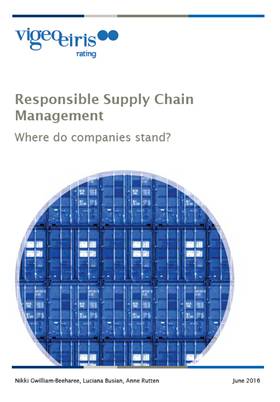Une politique ambitieuse de Vigeo
Alors que le changement climatique est sur le devant de la scène et que les entreprises et les investisseurs ne peuvent l’ignorer, l’agence de notation extra-financière Vigeo a publié le 12 janvier 2016 une politique ambitieuse intitulé « Post COP21: How well companies & investors are positioned to respond to climate change » (Policy Briefing, Climate Change & Transition to a Low Carbon Economy). Ce document rappelle haut et fort que le changement climatique est une affaire d’entreprise et d’investisseur !
Investors have already played a key role in bringing about COP21, and in the post COP21 landscape, investors are vital to ensure meaningful results.
No doubt initiatives such as the Montreal Pledge, the RE100 investor initiative, investor campaigns on stranded assets, and the plethora of events both before and during COP21, demonstrated to governments investor will and thought-leadership here. The growing corporate-investor-government nexus whereby some companies are calling for a credible carbon price/tax is significant.
The importance of incentives for emissions reduction activities are recognised in the Agreement preamble, including domestic policies and carbon pricing.16 These calls to action will drive forward collective performance on climate change, in addition to the ongoing pressure investors can put on companies through the investment process.
Responsible investment plays a leading role in highlighting companies’ exposure to the risks of climate change and evaluating their capacity to mitigate them. Analyses from research intermediaries such as Vigeo Eiris can help investors to understand and better manage these mounting climate change risks.
At present, only a small proportion of companies are found to have an advanced response to climate change and energy transition. To drive forward performance, companies could be encouraged to tie Board-level remuneration to climate change targets. Corporate reporting could be improved, particularly through use of quantitative assessments, and companies should be encouraged to report on the impact of the whole product lifecycle on emissions. There is also room for much greater corporate acknowledgement of the policy context.
À la prochaine…
Ivan Tchotourian
